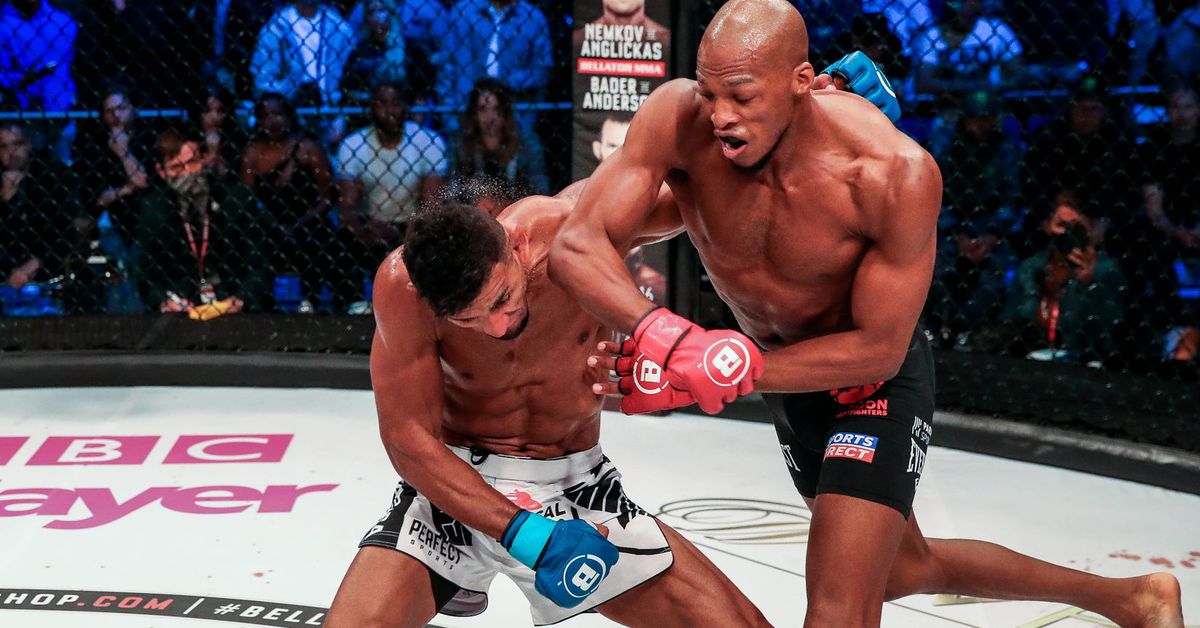Fans can credit Michael Page in part for Bellator’s shift to five-round non-title headliners. His three-round rematch with Douglas Lima at Bellator 268 spurred the ViacomCBS-owned promotion to make all main events championship length.
Page, however, doesn’t want be known as the poster boy for the switch – unless it’s accompanied by another that compensates everyone for the extra time.
“I don’t like how it was done, per se, simply because it felt like that fight was what pushed it ono that,” Page said Monday on The MMA Hour. “And I know there’s this big thing about fighter’s pay, but you’re asking me to do extra rounds, and without talking about our purses going up for doing so. So it’s 10 extra minutes that people get potentially.”
Bellator previously distinguished itself in the MMA marketplace by promoting three-round headliners when a title wasn’t on the line. The UFC ordered five-round main events 10 years ago in response to a chorus of interest in seeing closely contested matches get extra time; headliners are also frequently awarded an additional undisclosed bonus for the position.
Four months away from a potentially career-making title fight against champ Yaroslav Amosov, Page isn’t opposed to the practice – he’s scheduled for five rounds win or lose when they meet at Bellator London on May 13. He just wants promoters to see the big picture for everyone.
“I get why it’s done,” he said. “But I feel like it was a bit of a knee-jerk reaction to what took place versus sitting down and planning it out properly. And Scott Coker did mention he had spoken about it prior, anyway, but I didn’t see any of that. He may have, as well. It felt like it almost depleted my win against Lima, so it was just done with a bit too much haste. But at the same time, it makes sense. I completely understand why they would do that, and other organizations are already doing it, and it makes sense.
“I’m not just talking for myself, I’m talking for anybody that’s now going to be in that situation. There should now be a discussion about the extra time that’s going to be on that, same with any job in the world. If you’re going to do extra time, there’s talk of extra pay. It just feels like we get bullied a lot in this sport, and we’re already struggling over here. I feel like people need to take a little bit more consideration of the fighter and how it affects them, not just the entertainment side.”
It’s for that reason that Page found an unlikely kinship with Jake Paul, an opponent he previously sought to face in the ring as the YouTuber turned boxer picked up steam as a headlining attraction. He applauded Paul’s efforts to bring more attention to the fighter’s plight in attacking the UFC’s business practices.
“In all honesty, since then, I’ve actually been a fan in terms of what he’s actually pushing for, which did surprise me,” Page said. “It’s what he’s about in terms of what he’s trying to push on to the sport, and it’s something dear to my heart and something that obviously affects me and affects a lot of my colleagues and a lot of up-and-coming fighters that I’m training with in the gym.
“I would love to see in the next generation coming up that they don’t have the same struggles and complaints going through their career.”
Page no longer considers himself at odds with his promoter after a public spat over PR opportunities. When he fulfilled his previous Bellator contract, he didn’t attempt to test the market by becoming a free agent – he saw no need with his concerns addressed. He is hopeful that Bellator or another promoter could lead the charge in creating better conditions overall for fighters. But of course, someone has to go first.
“We need a competitor that is actually willing to make those kinds of things happen,” he said. “If it doesn’t start out with the biggest show in MMA, if they’re not willing to do it, other shows are going to have to be the first person to take that step, and it will definitely apply pressure to the biggest shows, because a lot of fighters are going to be like, ‘It’s better over there.’”


